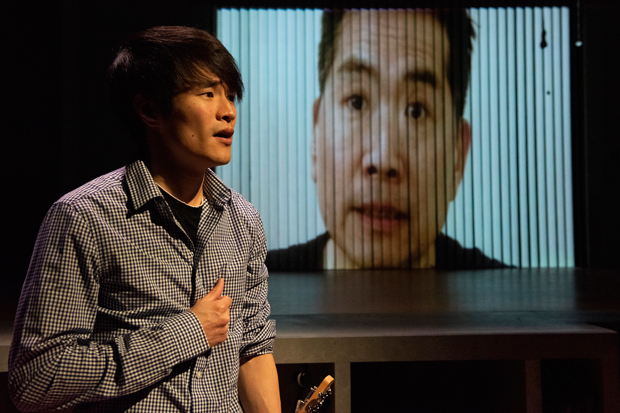Breaking Free From Troubling Familial and Cultural Bonds in Nomad Motel

(© Ahron R. Foster)
The broad themes Carla Ching tackles in Nomad Motel — now making its New York premiere courtesy of the Atlantic Theater Company — are hardly new: family dysfunction, generational differences, working-class struggles. But even in something of a boom time for plays about the Asian-American experience, Nomad Motel stands out for its sharp depiction of the clash between the very Asian value of filial piety and the very American focus on upward mobility.
Mason (Christopher Larkin) is Asian-American, while Alix (Molly Griggs) is wholly American. Both are high school students in Anaheim, California, but beyond that, the pair of classmates live different kinds of lives: Mason, a prototypical overachiever, resides in his own house and has everything provided by his father, James (Andrew Pang), who remains overseas in Hong Kong; by contrast, Alix lives with her harried mother, Fiona (Samantha Mathis), and two younger brothers in a motel while also working a part-time job on top of school. Suddenly, however, James — whose way of earning money for his son remains vague throughout, but appears to involve gang activities — disappears, leaving Mason to fend for himself in ways he has never had to do before.

(© Ahron R. Foster)
Even before his father's disappearance, Mason starts yearning to break free from his father's overprotective influence, investing most of the money Dad sends him on loop pedals and other such equipment to feed his musical interests. (When we enter the Atlantic Stage 2 theater, Mason is already seen downstage riffing with his guitar and loops.) Alix desires a similar deliverance from her poverty-ridden circumstances, even going so far as to seriously consider her ex-boyfriend Oscar's (Ian Duff) suggestion that they both just take a leap of faith and move to New York City. These similar circumstances eventually draw Mason and Alix together
The relationship between Alix and her mess of a mother is a rather familiar one, though instead of turning Fiona into merely an object of pity, Ching humanely paints her as sympathetic and dignified. More compelling is the relationship between Mason and his father. James, as with many Asians of his generation, sees himself as primarily a provider for his son, expecting him to follow the path he has laid out for him to ensure Mason won't struggle like he did in his younger days. Mason, however, sees more value in the deeply American instinct of pulling himself up by his own bootstraps and forging his own path. Ching is wise enough to allow us to understand where James, for all his toughness, is coming from. Perhaps the most poignant scene in the whole play comes toward the end, when both Fiona and James find themselves in the same room and commiserate about just how difficult parenting can be, wondering whether they've done the best they could for their children.

(© Ahron R. Foster)
In the end, though, Nomad Motel is largely a paean to the youthful idealism that Alix and Mason try to hold on to in spite of their immediate financial challenges. Depending on your perspective, Ching's play will come off as either genuinely inspirational or overly rosy. A heavy-handed metaphor involving a bird with a broken wing that Mason spends much of the play secretly nursing back to full health is bound to inspire eye rolls; as is a stylistically incongruous fencing match that erupts at the play's climax, temporarily turning a working-class drama into a martial-arts flick without warning.
Director Ed Sylvanus Iskandar's production doesn't always help, lending a certain artificiality to the proceedings. While the design team inventively suggests multiple settings on one stage, there's something a bit too slick in what ought to be a grittier evocation of life on the margins. Yu-Hsuan Chen's set is too neatly manicured to evoke the messy lived experiences of these characters; and Jeanette Oi-Suk Yew's lighting, featuring attractive use of neon on the stage's back wall, often feels more noir-like than naturalistic, a feeling enhanced by Emily Gardner Xu Hall and Enrico de Trizio's dreamy sound design. Iskandar's direction, in short, seems detached from the milieu that the play intends to explore — as, alas, do the bland lead performances of Larkin and Griggs. Mathis and Pang are more persuasive than their younger counterparts as the adult characters, both conveying a sense that they've gone through hell in their own lives; and as Oscar, Duff leaves a more authentic and magnetic impression than the two leads.
For all its shortcomings, Nomad Motel is generous and heartfelt enough to never quite lose the audience's goodwill. And in its depiction of a particular kind of cultural and generational gap, particularly through the Mason-James scenes, Ching's play does offer genuine insights into a kind of familial relationship that is rarely depicted onstage with such acuity.

(© Ahron R. Foster)










